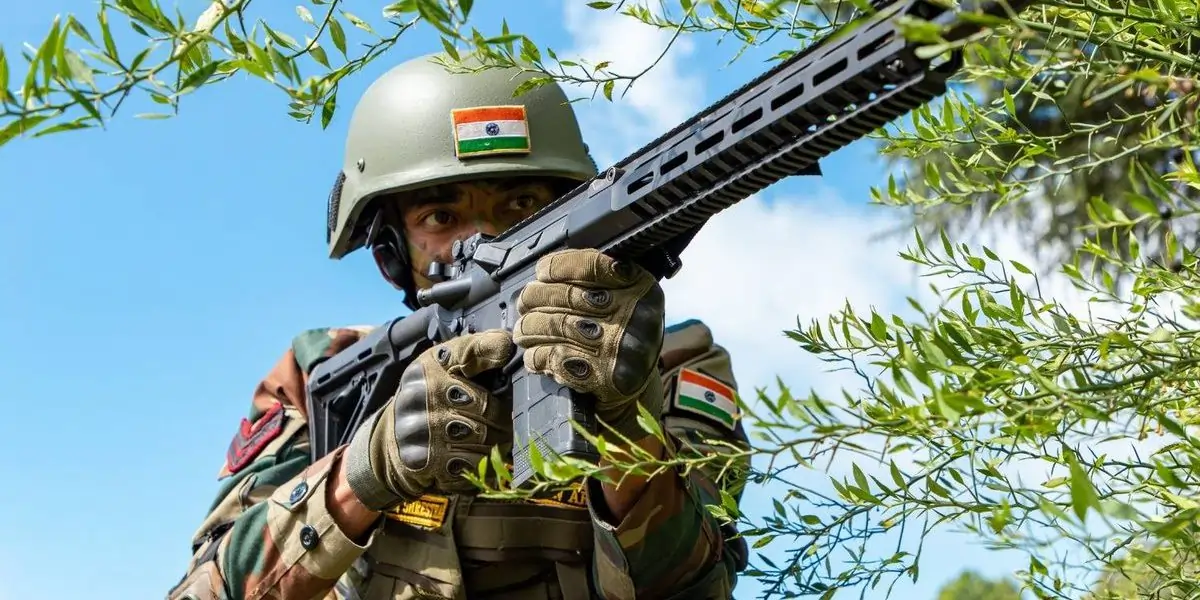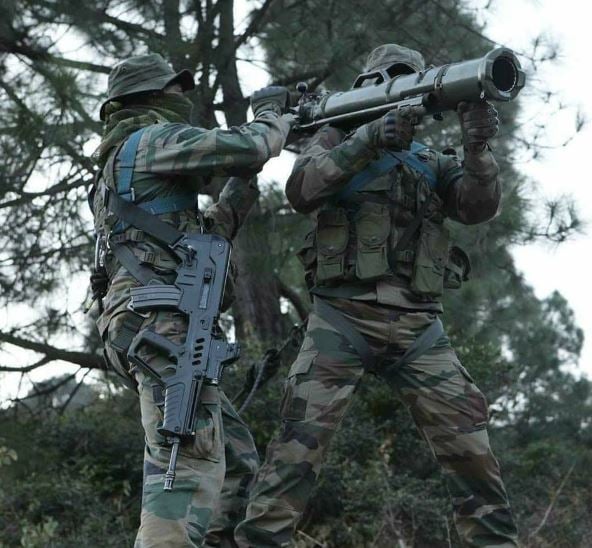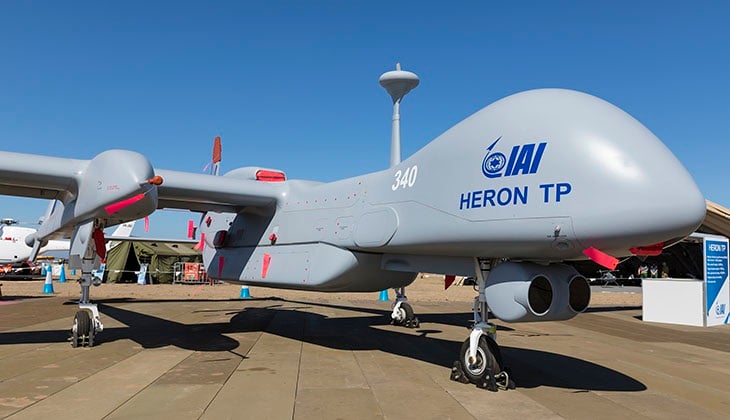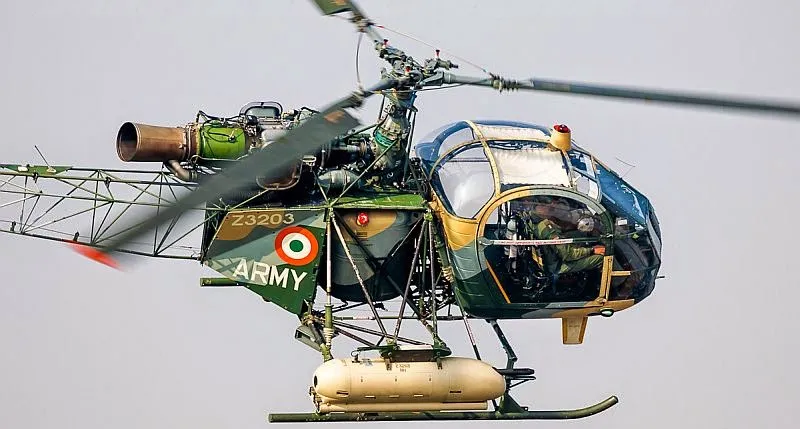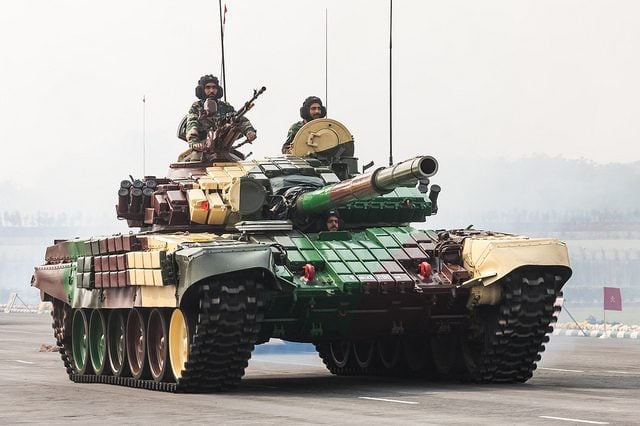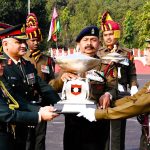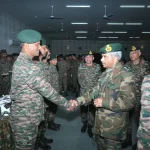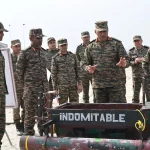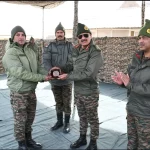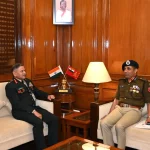The Indian Army, one of the most formidable land forces in the world, is equipped with a diverse and powerful arsenal designed to meet the demands of modern warfare. From state-of-the-art rifles and machine guns to advanced tanks, artillery systems, and missile platforms, every weapon in its inventory plays a vital role in ensuring national security and operational superiority.
Over the years, the Army has steadily modernized its weapon systems, blending indigenous innovations with cutting-edge imports to enhance combat readiness across all terrains whether in the icy heights of Siachen, the deserts of Rajasthan, or the dense jungles of the Northeast. This article presents a comprehensive list of weapons used by the Indian Army, highlighting their capabilities, origins, and significance in safeguarding the nation.
Assault Rifles:
The Indian Army’s primary assault rifle is the indigenous INSAS (Indian Small Arms System), which is a gas-operated, selective fire rifle that fires the 5.56x45mm NATO round. However, the INSAS has been criticized for its unreliability and the Indian Army is currently in the process of replacing it with a new assault rifle. The Indian Army has also imported a large number of AK-47 rifles, which are widely used by its troops.
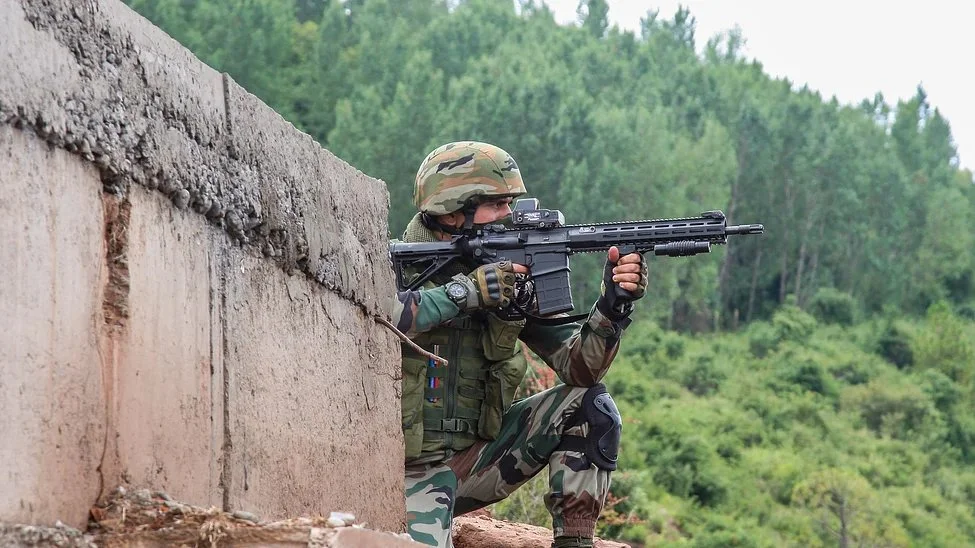
The Indian Army uses a variety of assault rifles, some of which are indigenous and others that are imported. Here is a list of the different assault rifles used by the Indian Army:
- INSAS (Indian Small Arms System): The INSAS is the primary assault rifle of the Indian Army. It is a gas-operated, selective-fire rifle that fires the 5.56x45mm NATO round.
- AK-47: The Indian Army also uses a large number of AK-47 rifles, which are widely used by its troops. These rifles are imported from countries like Russia and Romania.
- AK-74: The AK-74 is a variant of the AK-47 that fires the 5.45x39mm round. The Indian Army has a small number of AK-74 rifles in its inventory.
- TAR-21 (Tavor): The TAR-21 is an Israeli-made assault rifle that fires the 5.56x45mm NATO round. The Indian Army uses this rifle primarily in counter-terrorism operations.
- M16A2: The M16A2 is an American-made assault rifle that fires the 5.56x45mm NATO round. The Indian Army has a small number of M16A2 rifles in its inventory.
- SIG Sauer 716: The SIG Sauer 716 is a modern assault rifle that fires the 7.62x51mm NATO round. The Indian Army has recently purchased a large number of these rifles to replace the INSAS.
- AK-103: The AK-103 is a modern variant of the AK-47 that fires the 7.62x39mm round. The Indian Army has recently purchased a large number of these rifles to replace the INSAS.
- Excalibur: The Excalibur is an indigenous assault rifle that is currently under development by the Indian Army. It is designed to replace the INSAS in the future.
It’s important to note that the Indian Army is in the process of replacing the INSAS with a new assault rifle, which is yet to be finalized.
Sniper Rifles:
For long-range engagements, the Indian Army uses sniper rifles like the American-made Barrett M95, which fires the .50 BMG round and has a range of up to 1,800 meters. The Indian Army also uses the indigenous Vidhwansak sniper rifle, which fires the 7.62x51mm NATO round and has a range of up to 1,200 meters.
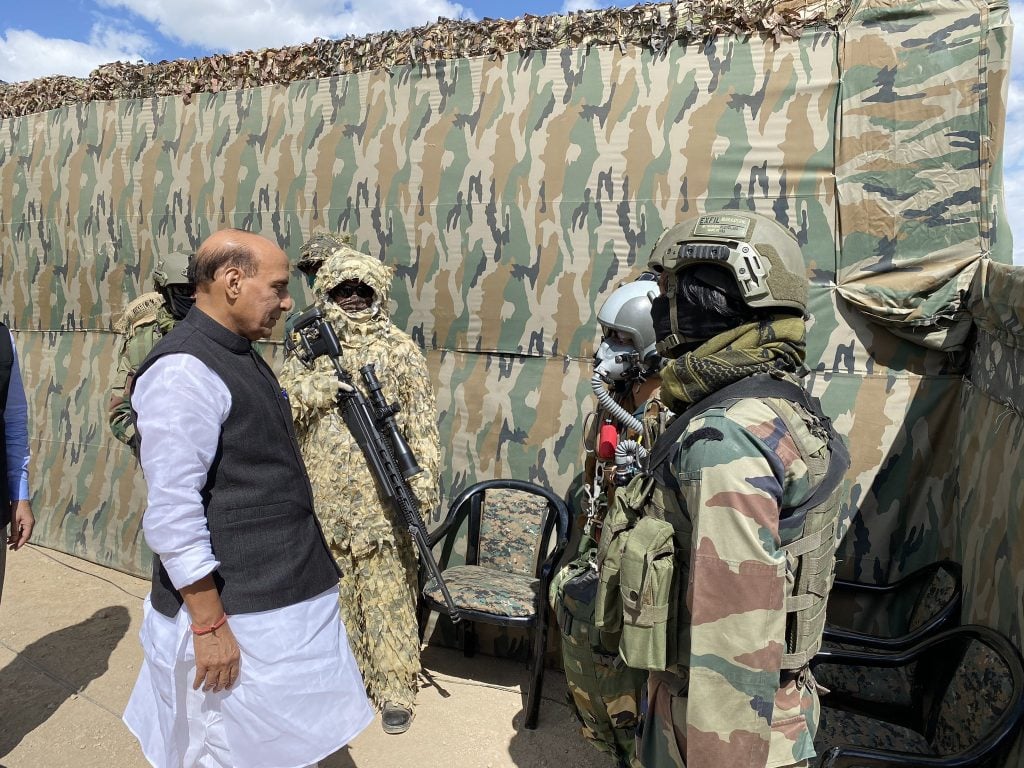
The Indian Army uses a variety of sniper rifles for long-range engagements. Here are some of the sniper rifles used by the Indian Army:
- Vidhwansak: The Vidhwansak is an indigenous sniper rifle that fires the 7.62x51mm NATO round. It has a range of up to 1,200 meters and is used by the Indian Army’s infantry units.
- Barrett M95: The Barrett M95 is an American-made sniper rifle that fires the .50 BMG round. It has a range of up to 1,800 meters and is used by the Indian Army’s special forces units.
- Beretta Scorpio TGT: The Beretta Scorpio TGT is an Italian-made sniper rifle that fires the .338 Lapua Magnum round. It has a range of up to 1,500 meters and is used by the Indian Army’s special forces units.
- Sako TRG-42: The Sako TRG-42 is a Finnish-made sniper rifle that fires the .338 Lapua Magnum round. It has a range of up to 1,500 meters and is used by the Indian Army’s special forces units.
- Dragunov: The Dragunov is a Russian-made sniper rifle that fires the 7.62x54mmR round. It has a range of up to 800 meters and is used by the Indian Army’s infantry units.
- Accuracy International Arctic Warfare: The Accuracy International Arctic Warfare is a British-made sniper rifle that fires the .338 Lapua Magnum round. It has a range of up to 1,500 meters and is used by the Indian Army’s special forces units.
- PSG1: The PSG1 is a German-made sniper rifle that fires the 7.62x51mm NATO round. It has a range of up to 800 meters and is used by the Indian Army’s special forces units.
It’s worth noting that the Indian Army is always evaluating and updating its sniper rifle inventory based on evolving security requirements and the development of new technologies.
Machine Guns:
The Indian Army uses a variety of machine guns, including the indigenous 7.62mm PKT machine gun, which is used in the T-72 and T-90 tanks, and the 7.62mm LMG, which is a light machine gun that is used by infantry units. The Indian Army also uses the FN MAG machine gun, which is a Belgian-made machine gun that fires the 7.62x51mm NATO round and is used by infantry units and mounted on vehicles.
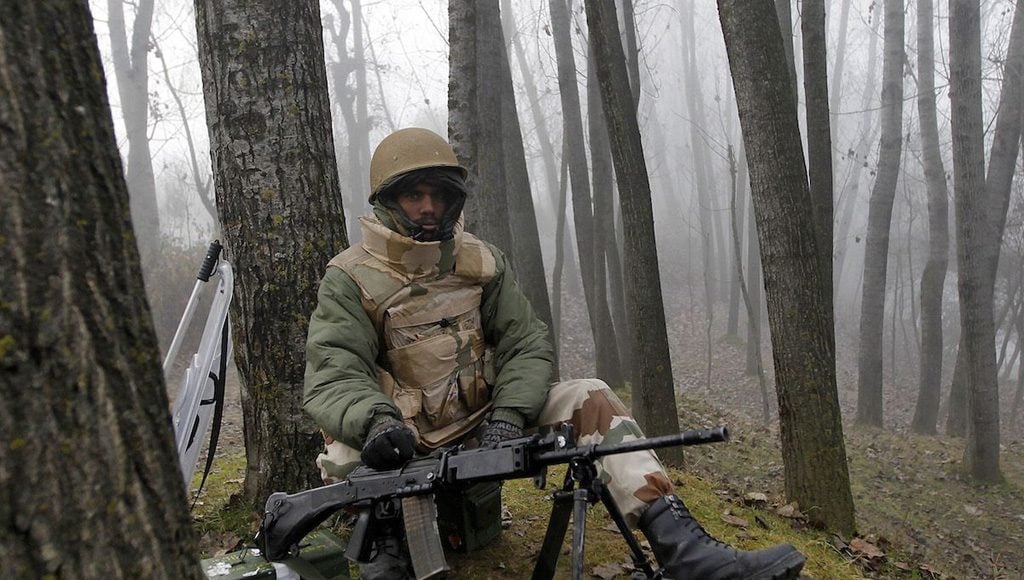
The Indian Army uses a variety of machine guns to provide covering fire, suppressive fire, and to engage targets at a distance. Here are some of the machine guns used by the Indian Army:
- INSAS LMG: The INSAS LMG (Light Machine Gun) is a belt-fed machine gun that fires the 5.56x45mm NATO round. It has a cyclic rate of fire of 650 rounds per minute and is used by the Indian Army’s infantry units.
- FN MAG: The FN MAG (Mitrailleuse d’Appui Général) is a Belgian-made machine gun that fires the 7.62x51mm NATO round. It has a cyclic rate of fire of 650-1,000 rounds per minute and is used by the Indian Army’s infantry and special forces units.
- PKM: The PKM (Pulemyot Kalashnikova Modernizirovannyi) is a Russian-made machine gun that fires the 7.62x54mmR round. It has a cyclic rate of fire of 650-800 rounds per minute and is used by the Indian Army’s infantry units.
- Browning M2: The Browning M2 is an American-made heavy machine gun that fires the .50 BMG round. It has a cyclic rate of fire of 450-600 rounds per minute and is used by the Indian Army’s infantry and special forces units.
- NSV: The NSV (Nikitin-Shevchenko Vintovka) is a Russian-made heavy machine gun that fires the 12.7x108mm round. It has a cyclic rate of fire of 700-800 rounds per minute and is used by the Indian Army’s infantry and special forces units.
- DShK: The DShK (Degtyaryov-Shpagin Krupnokaliberny) is a Russian-made heavy machine gun that fires the 12.7x108mm round. It has a cyclic rate of fire of 600-800 rounds per minute and is used by the Indian Army’s infantry units.
- ZU-23-2: The ZU-23-2 is a Russian-made anti-aircraft gun that fires the 23x152mmB round. It has a cyclic rate of fire of 200-2,000 rounds per minute and is used by the Indian Army’s air defense units.
It’s important to note that the Indian Army is constantly evaluating and updating its machine gun inventory based on evolving security requirements and the development of new technologies.
Grenade Launchers:
The Indian Army uses a range of grenade launchers, including under-barrel grenade launchers like the M203 and standalone launchers like the Russian-made RPG-7. The Indian Army also uses the 40mm L70 grenade launcher, which is a Swedish-made launcher that can fire up to 300 rounds per minute.
The Indian Army uses various types of grenade launchers to provide additional firepower and support to infantry units. Here are some of the grenade launchers used by the Indian Army:
- AGS-30: The AGS-30 is a Russian-made automatic grenade launcher that fires 30mm grenades. It has a range of up to 1,700 meters and is used by the Indian Army’s infantry and special forces units.
- MM-1: The MM-1 is an American-made 40mm multiple grenade launcher that can fire up to six grenades in rapid succession. It has a range of up to 400 meters and is used by the Indian Army’s infantry units.
- HK GMG: The HK GMG (Heckler & Koch Grenade Machine Gun) is a German-made automatic grenade launcher that fires 40mm grenades. It has a range of up to 1,800 meters and is used by the Indian Army’s special forces units.
- Carl Gustav: The Carl Gustav is a Swedish-made recoilless rifle that can fire both anti-tank and high-explosive rounds. It has a range of up to 1,000 meters and is used by the Indian Army’s infantry and special forces units.
- RPG-7: The RPG-7 (Ruchnoy Protivotankovyy Granatomyot) is a Russian-made rocket-propelled grenade launcher that fires anti-tank and anti-personnel grenades. It has a range of up to 500 meters and is used by the Indian Army’s infantry units.
- M79 Grenade Launcher: The M79 grenade launcher is an American-made single-shot launcher that fires 40mm grenades. It has a range of up to 400 meters and is used by the Indian Army’s infantry units.
- Milkor MGL: The Milkor MGL (Multiple Grenade Launcher) is a South African-made launcher that can fire up to six 40mm grenades in rapid succession. It has a range of up to 400 meters and is used by the Indian Army’s infantry units.
It’s important to note that the Indian Army is constantly evaluating and updating its grenade launcher inventory based on evolving security requirements and the development of new technologies.
Artillery:
The Indian Army uses a variety of artillery systems, including the indigenous Dhanush howitzer, which is a 155mm towed howitzer that has a range of up to 38 km. The Indian Army also uses the American-made M777 howitzer, which is a 155mm towed howitzer that has a range of up to 30 km. In addition, the Indian Army uses multiple rocket launchers like the Pinaka, which is a multiple rocket launcher system that fires 12 rockets in 44 seconds and has a range of up to 40 km.
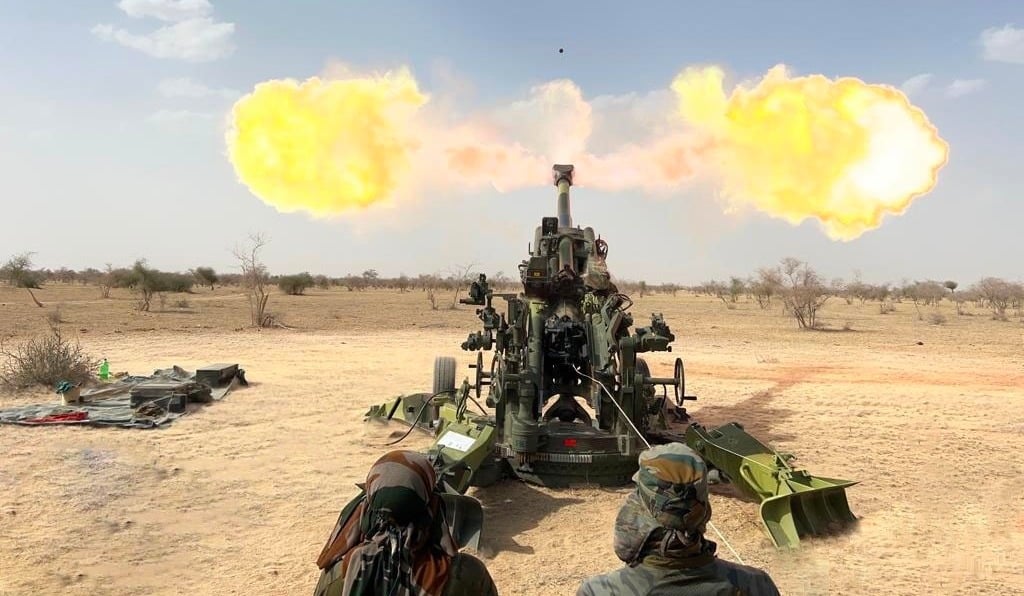
The Indian Army relies on artillery guns for providing fire support to troops and taking out enemy targets from a distance. Here are some of the artillery guns used by the Indian Army:
- Bofors 155mm Howitzer: The Bofors 155mm Howitzer is a Swedish-made artillery gun that can fire up to 4 rounds per minute to a range of up to 30 km. It is widely used by the Indian Army and is considered one of its most effective artillery systems.
- M777 Howitzer: The M777 Howitzer is an American-made lightweight artillery gun that can be easily airlifted to high altitude and mountainous areas. It can fire up to 5 rounds per minute to a range of up to 30 km.
- Dhanush Artillery Gun: The Dhanush Artillery Gun is an indigenous 155mm howitzer developed by the Indian Army’s Ordnance Factory Board. It can fire up to 6 rounds per minute to a range of up to 38 km.
- 105mm Indian Field Gun: The 105mm Indian Field Gun is an Indian-made artillery gun that can fire up to 5 rounds per minute to a range of up to 17 km. It is used by the Indian Army’s artillery regiments.
- Pinaka Multi-Barrel Rocket Launcher: The Pinaka Multi-Barrel Rocket Launcher is an Indian-made artillery system that can fire 12 rockets in just 44 seconds. It has a range of up to 40 km and is used by the Indian Army’s artillery units.
- Smerch Multi-Barrel Rocket Launcher: The Smerch Multi-Barrel Rocket Launcher is a Russian-made artillery system that can fire up to 12 rockets in just 40 seconds. It has a range of up to 90 km and is used by the Indian Army’s artillery units.
- Sharang Artillery Gun: The Sharang Artillery Gun is an indigenous 155mm howitzer developed by the Indian Army’s Ordnance Factory Board. It can fire up to 2 rounds per minute to a range of up to 39 km.
The Indian Army is also in the process of inducting newer artillery guns such as the K9 Vajra-T, a 155mm self-propelled howitzer developed in collaboration with South Korea. The Army is constantly evaluating and updating its artillery inventory to meet evolving security requirements and to incorporate technological advancements.
Missiles:
The Indian Army has a range of missile systems, including the BrahMos missile, which is a supersonic cruise missile that has a range of up to 290 km and can carry a 300 kg warhead. The Indian Army also uses the indigenous Prithvi ballistic missile, which has a range of up to 350 km and can carry a 1,000 kg warhead.
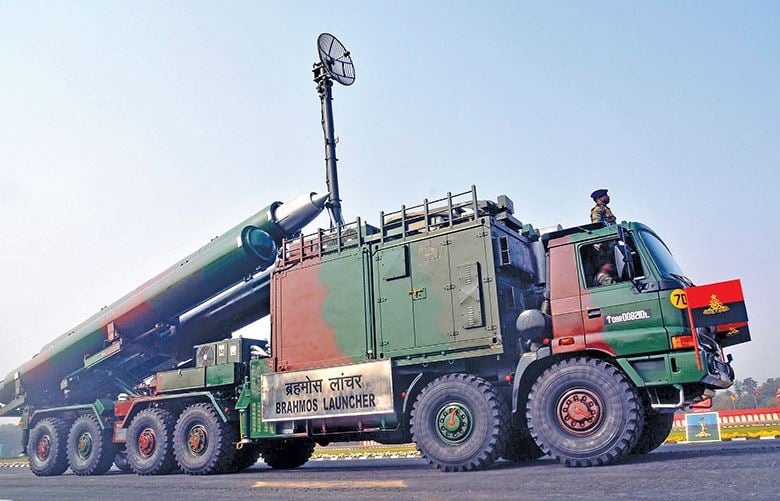
The Indian Army has a wide range of missiles in its inventory, which are used for various purposes including anti-tank, anti-aircraft, and surface-to-surface strikes. Here are some of the missiles used by the Indian Army:
- BrahMos: The BrahMos is a supersonic cruise missile jointly developed by India and Russia. It has a range of up to 290 km and can be launched from land, sea, and air platforms. The Indian Army has deployed the land-based variant of the BrahMos missile.
- Nag: The Nag is an anti-tank missile developed indigenously by India. It has a range of up to 4 km and can be launched from ground-based and helicopter platforms. The Nag missile uses infrared imaging and has a top-attack capability to defeat armored targets.
- Akash: The Akash is a surface-to-air missile developed by India. It has a range of up to 30 km and is used for air defense of ground assets against enemy aircraft, helicopters, and UAVs. The Akash missile uses a command guidance system and has an electronic counter-countermeasures capability.
- Prithvi: The Prithvi is a surface-to-surface ballistic missile developed by India. It has a range of up to 350 km and can carry both conventional and nuclear warheads. The Indian Army has deployed the short-range variant of the Prithvi missile.
- Shaurya: The Shaurya is a hypersonic surface-to-surface missile developed by India. It has a range of up to 750 km and can carry conventional warheads. The Shaurya missile can be launched from land-based platforms.
- Astra: The Astra is an air-to-air missile developed by India. It has a range of up to 110 km and is used by the Indian Air Force and Indian Navy. The Astra missile uses an active radar seeker and can engage targets at high altitudes and speeds.
- Prahaar: The Prahaar is a short-range ballistic missile developed by India. It has a range of up to 150 km and can carry conventional warheads. The Prahaar missile can be launched from a mobile launcher and is primarily used for battlefield support.
The Indian Army is constantly upgrading its missile inventory to enhance its capabilities and to counter emerging threats.
Grenades:
The Indian Army uses a variety of grenades for different purposes including offensive, defensive, and crowd control operations. Here are some of the grenades used by the Indian Army:
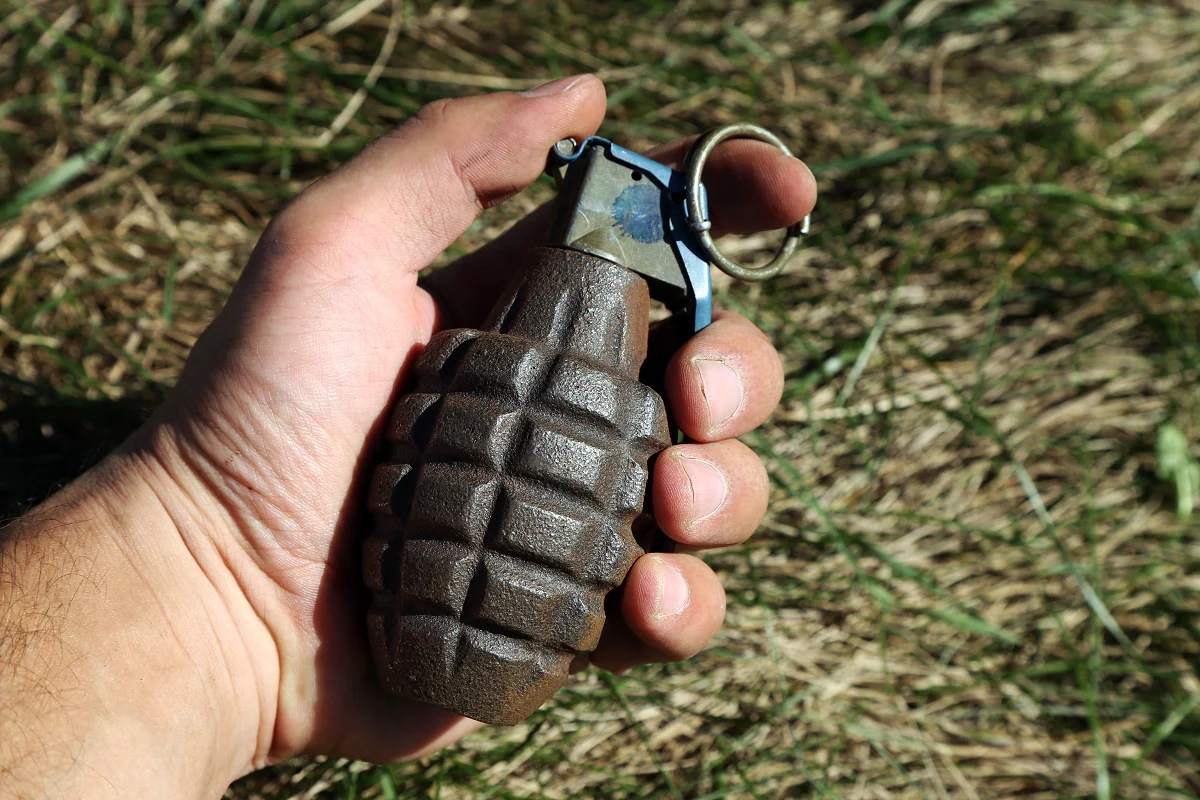
- Fragmentation Grenade: The Fragmentation Grenade is a defensive grenade used to cause casualties to enemy personnel. It contains small metal fragments or balls that scatter upon explosion, causing shrapnel wounds to nearby personnel. Like Multi-Mode Hand Grenades (MMHG) and DRDO Shivalik.
- Smoke Grenade: The Smoke Grenade is a defensive grenade used to create a smoke screen to provide cover for troops or to obscure enemy observation. It produces a dense cloud of smoke upon explosion.
- Stun Grenade: The Stun Grenade is an offensive grenade used for crowd control and to disorient or temporarily blind enemy personnel. It produces a bright flash of light and a loud sound upon explosion.
- Tear Gas Grenade: The Tear Gas Grenade is an offensive grenade used for riot control and crowd dispersal. It releases a chemical irritant upon explosion that causes eye and respiratory irritation.
- Thermobaric Grenade: The Thermobaric Grenade is an offensive grenade used to destroy enemy personnel and structures. It creates a blast wave upon explosion that causes lethal damage to nearby personnel and destroys structures.
- Offensive Hand Grenade: The Offensive Hand Grenade is a handheld explosive device used for close combat and urban warfare. It contains high explosives that cause lethal damage to nearby personnel.
- Anti-Tank Grenade: The Anti-Tank Grenade is a handheld explosive device used to disable or destroy enemy tanks and armored vehicles. It contains high explosives that can penetrate armor and cause damage to internal components.
The Indian Army also uses various types of special-purpose grenades, such as underwater grenades, illuminating grenades, and practice grenades, for training and operational purposes. The Army is constantly upgrading its grenade inventory to meet evolving security requirements and to incorporate technological advancements.
UAVs:
The Indian Army operates a wide range of unmanned aerial vehicles (UAVs) for various purposes, including reconnaissance, surveillance, and targeting. Here are some of the UAVs used by the Indian Army:
- Searcher Mk II: The Searcher Mk II is a medium-range, multi-mission UAV used for surveillance, reconnaissance, and target acquisition. It has a range of up to 300 km and can operate at an altitude of up to 7 km. The Searcher Mk II is equipped with day and night vision sensors and can transmit real-time video and imagery.
- Heron: The Heron is a medium-altitude, long-endurance UAV used for reconnaissance, surveillance, and target acquisition. It has a range of up to 350 km and can operate at an altitude of up to 9 km. The Heron is equipped with a synthetic aperture radar, electro-optical/infrared sensors, and can transmit real-time video and imagery.
- Nishant: The Nishant is a medium-range, autonomous UAV used for reconnaissance, surveillance, and target acquisition. It has a range of up to 100 km and can operate at an altitude of up to 3.5 km. The Nishant is equipped with a day/night camera and can transmit real-time video and imagery.
- Panchi: The Panchi is a micro-UAV used for surveillance and reconnaissance. It has a range of up to 10 km and can operate at an altitude of up to 1.5 km. The Panchi is equipped with a day/night camera and can transmit real-time video and imagery.
- Netra: The Netra is a small, portable UAV used for surveillance and reconnaissance. It has a range of up to 2 km and can operate at an altitude of up to 200 meters. The Netra is equipped with a day/night camera and can transmit real-time video and imagery.
- Skylark: The Skylark is a small, portable UAV used for surveillance and reconnaissance. It has a range of up to 10 km and can operate at an altitude of up to 1.5 km. The Skylark is equipped with a day/night camera and can transmit real-time video and imagery.
- Raven: The Raven is a small, hand-launched UAV used for reconnaissance and surveillance. It has a range of up to 10 km and can operate at an altitude of up to 500 meters. The Raven is equipped with a day/night camera and can transmit real-time video and imagery.
The Indian Army is constantly upgrading its UAV inventory to enhance its capabilities and to counter emerging threats.
Aircraft:
The Indian Army does not have its own dedicated aircraft, but it operates helicopters for various purposes, including troop transport, logistics, and casualty evacuation. Here are some of the helicopters used by the Indian Army:
- HAL Dhruv: The HAL Dhruv is a multi-role helicopter manufactured by Hindustan Aeronautics Limited. It is used by the Indian Army for reconnaissance, surveillance, and troop transport. It has a maximum speed of 290 km/h and a range of up to 640 km.
- Mi-17: The Mi-17 is a transport helicopter manufactured by the Russian company Mil. It is used by the Indian Army for troop transport, logistics, and casualty evacuation. It has a maximum speed of 250 km/h and a range of up to 580 km.
- CH-47 Chinook: The CH-47 Chinook is a heavy-lift helicopter manufactured by the American company Boeing. It is used by the Indian Army for troop transport, logistics, and heavy equipment transport. It has a maximum speed of 315 km/h and a range of up to 1,100 km.
- ALH Rudra: The ALH Rudra is a weaponized version of the HAL Dhruv helicopter. It is used by the Indian Army for reconnaissance, surveillance, and close air support. It is equipped with rockets, missiles, and guns for ground attack.
- Cheetah: The Cheetah is a light helicopter manufactured by Aerospatiale. It is used by the Indian Army for reconnaissance, surveillance, and casualty evacuation. It has a maximum speed of 185 km/h and a range of up to 530 km.
- Chetak: The Chetak is a light helicopter manufactured by Aerospatiale. It is used by the Indian Army for troop transport, logistics, and reconnaissance. It has a maximum speed of 225 km/h and a range of up to 500 km.
The Army is constantly upgrading its helicopter inventory to enhance its capabilities and to meet evolving operational requirements.
Tanks:
The Indian Army operates a variety of tanks for various roles and missions. Here are some of the tanks used by the Indian Army:
- Arjun Main Battle Tank (MBT): This is India’s first indigenously designed and developed tank. The Arjun MBT is equipped with a 120 mm main gun, a 7.62 mm coaxial machine gun, and a 12.7 mm anti-aircraft machine gun.
- T-90S Bhishma: This is a Russian-made tank that was inducted into the Indian Army in 2001. The T-90S is equipped with a 125 mm smoothbore gun, a 7.62 mm coaxial machine gun, and a 12.7 mm anti-aircraft machine gun.
- T-72M1: This is a Soviet-made tank that was inducted into the Indian Army in the 1970s. The T-72M1 is equipped with a 125 mm smoothbore gun, a 7.62 mm coaxial machine gun, and a 12.7 mm anti-aircraft machine gun.
- Ajeya: This is an Indian version of the Soviet T-72M1 tank. It has been modified to suit Indian requirements and is equipped with a 125 mm smoothbore gun, a 7.62 mm coaxial machine gun, and a 12.7 mm anti-aircraft machine gun.
- Vijayanta: This is an Indian-made tank that was in service with the Indian Army from 1965 to 2003. The Vijayanta was equipped with a 105 mm rifled gun, a 7.62 mm coaxial machine gun, and a 12.7 mm anti-aircraft machine gun.
- BMP-2: This is a Soviet-made infantry fighting vehicle that is used by the Indian Army. It is equipped with a 30 mm automatic cannon, a 7.62 mm machine gun, and an anti-tank guided missile launcher.
- BMP-1: This is a Soviet-made infantry fighting vehicle that was in service with the Indian Army until it was replaced by the BMP-2. It is equipped with a 73 mm smoothbore gun, a 7.62 mm machine gun, and an anti-tank guided missile launcher.
- Casspir: This is a South African-made mine-protected vehicle that is used by the Indian Army for mine-clearing operations. It is equipped with a 7.62 mm machine gun.
These are some of the tanks and armored vehicles used by the Indian Army. The army is also in the process of developing and inducting new tanks and armored vehicles to enhance its capabilities.
The Indian Army has a wide range of weapons and equipment to support its operations, and is constantly updating its inventory to keep up with changing security challenges. While the Indian Army has made significant strides in indigenous weapons development, it still relies heavily on imported weapons and equipment to meet its needs. The Indian Army is also actively exploring new technologies like drones and robotics to enhance its capabilities on the battlefield.

